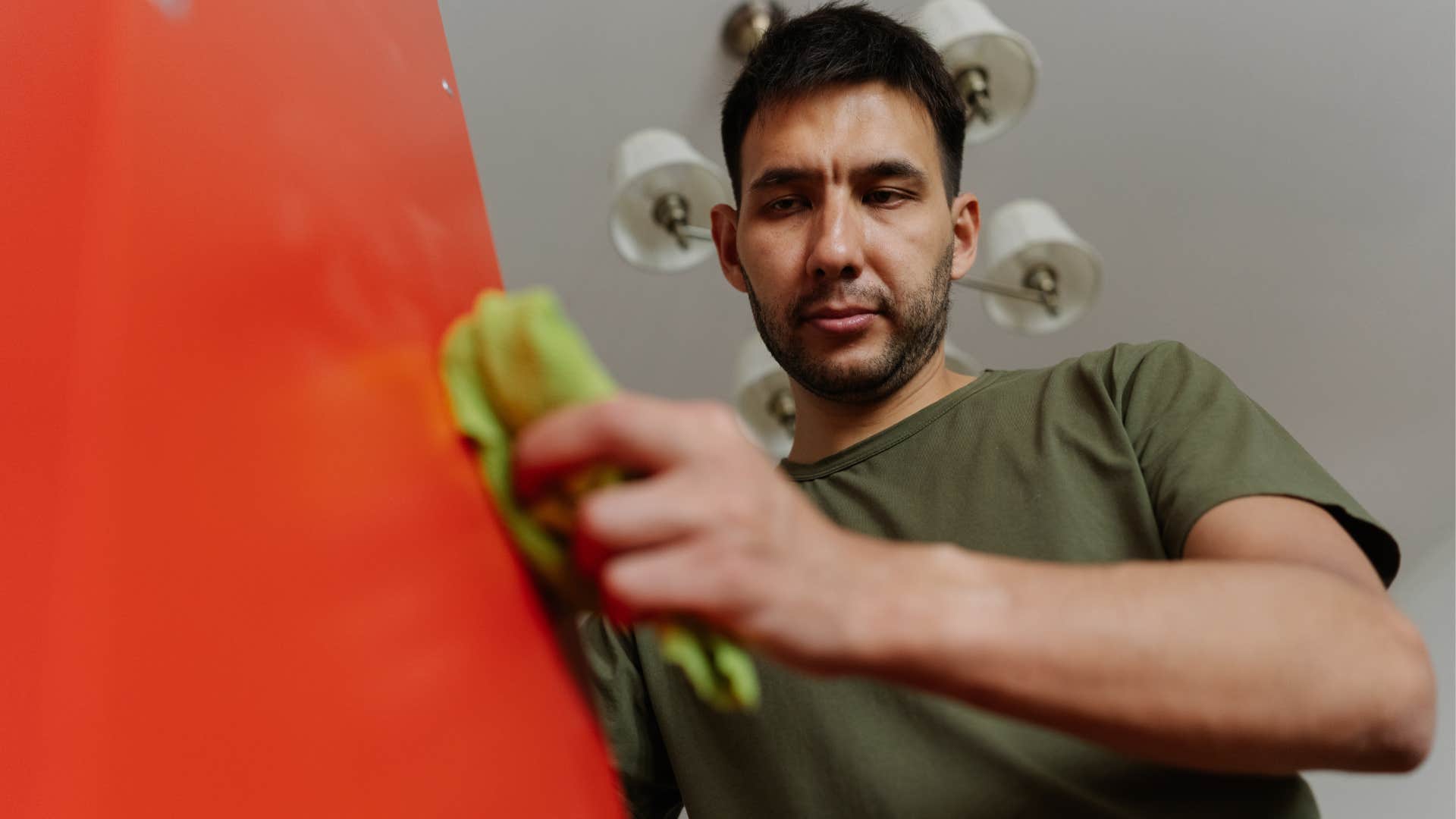If A Husband Feels Taken For Granted, He'll Stop Offering These 11 Everyday Kindnesses
He's sick of putting in effort and getting nothing in return.
 PeopleImages | Shutterstock
PeopleImages | Shutterstock Feeling appreciated and cared for in a relationship may seem subtle, but it's actually the root of positive relationships, according to a study from Current Opinion in Psychology. Not only do acts of appreciation and gratitude bond couples closer together, but they also tend to serve as a buffer against negative experiences, tension, and frustration.
However, when gratitude is replaced with resentment and subtle acts of kindness are overlooked, partners can quickly grow apart, even in long-term marriages. In fact, even with small things like making eye contact, if a husband feels taken for granted, he'll stop offering these everyday kindnesses. You may not thank a partner enough or even notice these tiny daily rituals, but the moment they're gone, everything shifts.
If a husband feels taken for granted, he’ll stop offering these 11 everyday kindnesses
1. Making eye contact during a conversation
 Geber86 | Shutterstock
Geber86 | Shutterstock
Even if it seems silly, making intentional eye contact is a strong facet of active listening that ensures couples feel safe, secure, and heard when expressing concerns, thoughts, and emotions. Without this tiny body language and kindness, everyone starts to feel more disconnected and overlooked.
Like a study from Perspectives on Psychological Science explains, eye contact is an essential part of communication for marital partners, but when it's overlooked, intimacy can worsen over time. If a husband doesn't feel heard when he's speaking, chances are he'll stop offering everyday kindnesses like his attention or eye contact for his partner.
2. Making coffee or breakfast
 Drazen Zigic | Shutterstock
Drazen Zigic | Shutterstock
Oftentimes, it's the little things in relationships that make the biggest difference for partner happiness and romantic love. However, if a husband isn't being appreciated, thanked, or even recognized for engaging in these small things — like making breakfast in the morning or starting his wife's car on a cold day — chances are he'll feel less motivated to keep doing them.
Even if he's not doing it regularly on an everyday basis, if a husband feels taken for granted, he may also stop offering to help. From making breakfast to doing chores and even making his wife a cup of coffee, offering help is a bonding agent for couples, sparking closeness even when the most secure couples are subtly drifting apart.
3. Giving casual compliments
 VGstockstudio | Shutterstock
VGstockstudio | Shutterstock
Compliments in marriage don't just bond couples closer together and boost self-esteem, like a study from the Journal of Personality and Social Psychology suggests — they also serve as a buffer for negativity, like other small everyday kindnesses. For every argument, petty disagreement, or misunderstanding, there's another handful of positive compliments and interactions that make up for those negativities.
However, when a husband feels taken for granted and isn't receiving that same kind of support or romantic love in passing moments, he might stop making time for them himself. He may stop offering compliments because he's no longer paying attention or going out of his way to help boost his partner's mood on a bad day. Without gratitude for his little acts of kindness, it all feels like a waste of time and energy.
4. Doing the 'least favorite' chores
 Dikushin Dmitry | Shutterstock
Dikushin Dmitry | Shutterstock
If you're in a relationship, chances are you know what chores each partner does. Maybe, one partner does the ones that you don't like, like taking out the trash or emptying the dishwasher, to leave chores that you find enjoyable.
However, if a husband feels taken for granted, he'll stop offering these everyday kindnesses and start putting his convenience above your comfort. Considering women tend to take on the majority of household labor in many households, this dynamic can cause considerable tension, especially when there's a disconnect on an emotional level.
5. Solving things together
 DimaBerlin | Shutterstock
DimaBerlin | Shutterstock
Whether it's a financial problem plaguing both partners or something larger like navigating through a rough patch in a marriage, if a husband feels like his effort or kindness is being taken for granted, he'll stop making space for solving problems together on a daily basis.
Not only does this sabotage truly healthy conflict-resolution skills that boost both partners' health and well-being, but it also creates distance in the communication habits that bond couples closer together amid the mundanity of everyday life. Without space to resolve problems together or to come together as a team, chances are both partners will start putting their own comfort and convenience above connection and grace as a couple.
6. Laughing together and cracking jokes
 Branislav Nenin | Shutterstock
Branislav Nenin | Shutterstock
From laughing at his own mistakes to chuckling openly and naturally with his partner, if a husband feels taken for granted, he'll stop offering these everyday kindnesses that bond the couple closer together. While it might seem insignificant and silly for laughter to be overlooked in a relationship, especially amid the chaos of everyday life, it's actually a huge indicator of romantic love.
When couples laugh together, they feel inherently closer and more connected, but they also reap the personal health benefits that come from smiling and laughing. Everything feels more serious, and there's an emotional wall that goes up between the partners, even if it's not obvious right away.
7. Cuddling before going to bed
 Gladskikh Tatiana | Shutterstock
Gladskikh Tatiana | Shutterstock
According to a study published in the Journal of Social and Personal Relationships, partners who regularly cuddle before going to bed feel more connected and satisfied in their relationships compared to those who don't make time for it. So, if a husband starts going to bed earlier or avoiding physical touch before bed, that could be a sign that he's not feeling appreciated or connected.
Of course, a loss of romantic feelings or disconnection on an emotional level in a marriage can feel overwhelming, but oftentimes it's easier to mend when you notice small changes in trust or intimacy early on. These subtle things, like not making time for physical touch, can be signs of lost intimacy that most commonly sabotages long-term love relationships — don't ignore them.
8. Boosting his partner's mood
 Prostock-studio | Shutterstock
Prostock-studio | Shutterstock
It takes a lot of intention, effort, and grace to notice when a partner is feeling subtle moods like sadness, especially amid the chaos of everyday life and responsibilities at home, according to a study from Family Process. However, a truly healthy and happy husband will always notice when his partner's mood is just a little bit off, and often also offers small kindnesses to boost their vibe.
But if he starts missing important cues and avoiding quality time together that would otherwise offer space for these behaviors, chances are he's feeling taken for granted. If he's not receiving a similar bare minimum kind of effort or validation from his partner, it may be much harder to work up the energy to support their ever-changing needs.
9. Making an effort with friends and family
 fizkes | Shutterstock
fizkes | Shutterstock
If your partner has a resentful parent-in-law or a problematic friend, it's sometimes much easier to put in an effort with them when you truly feel loved and supported at home. You know that regardless of what they say or do, you'll always have your partner at home to debrief with.
However, if a husband feels taken for granted at home and doesn't have a safe space to feel appreciated with his partner, it may be less empowering to tolerate misbehavior from friends or to put in effort with a rude family member. Once an everyday kindness, it has now become a chore that he's just not willing to do without love, connection, and support at home.
10. Saying 'I love you'
 Kmpzzz | Shutterstock
Kmpzzz | Shutterstock
Many deep and obscure emotional shifts happen when a couple falls out of love in a marriage, but one of the more obvious ones is simply expressing it. If a husband stops saying "I love you" to his partner out of the blue, chances are it's not a mistake.
According to Harvard psychologist Dr. Cortney Warren, it's these small kindnesses and phrases that truly matter the most, especially in a long-term marriage that's not only defined by the "big" moments, but also the small passing ones.
11. Planning dates
 Studio Romantic | Shutterstock
Studio Romantic | Shutterstock
Although there's often plenty of time and space at home to prioritize quality time and connection in a healthy way, sometimes getting out of the house, trying new things, and reconnecting on a planned date is also important for long-term couples. That's why husbands who feel taken for granted often stop making time for these special moments. Why put in effort to plan something and come together when they're missing the bare minimum in exchange?
Of course, transactional relationships with rewards and punishments are inherently toxic, but husbands being taken for granted simply stop putting in effort for the "above-and-beyond" kindnesses they used to make the time for.
Zayda Slabbekoorn is a senior editorial strategist with a bachelor's degree in social relations & policy and gender studies who focuses on psychology, relationships, self-help, and human interest stories.

